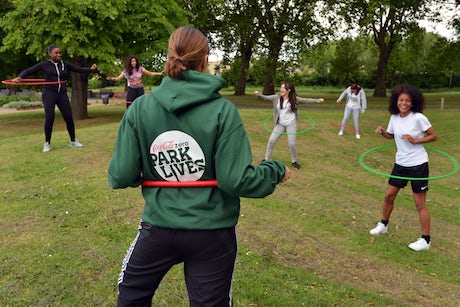Coke launches free fitness classes as part of £20m anti-obesity drive
Coca-Cola Great Britain is launching a £20m anti-obesity drive as part of its efforts to get 1 million people in the region more active by 2020 with the creation of Coca-Cola Zero ParkLives.

Coca-Cola Zero ParkLives will see the no-sugar brand launch a series of free organised activities – such as table tennis, tai chi, badminton, pilates, canoeing, rounders, hula-hooping, “Buggyfit” and zumba – across more than 70 parks across Britain in the summer months.
In its first year the programme, which has been developed in partnership with local councils, will be run in Birmingham, Newcastle and Newham in London. Coca-Cola says the activities available to try in each city have been informed by regional research and will be led by coaches from the local area.
From 2015, Coca-Cola Zero ParkLives will expand to more cities as the company looks to achieve the ambition set out earlier this year to get 1 million people active in Great Britain by 2020.
The success of the ParkLives programme will be measured by a panel organised by physical activity network UKactive, which is chaired by Professor Greg Whyte of Liverpool John Moores University and includes representatives from the National Centre for Sports and Exercise Medicine in Sheffield and the University of Aberystwyth.
Jon Woods, Coca-Cola Great Britain general manager, says: “It’s widely acknowledged that leading an active lifestyle is one of the most important things we can all do to increase our overall health and happiness – after all, the more you move, the happier you feel. We know that cost is a barrier to participation so we hope that the free programme of activities will inspire local people to enjoy getting active a bit more and come together with friends and family in their local parks. We will expand the programme in the years ahead to provide more people in more cities with the opportunity to get moving and have fun.”
The soft drinks maker was one of the early signatories to the Department of Health’s Responsibility Deal Calorie Reduction Pledge in 2012 and since then has embarked on a range of marketing activities including a global anti-obesity advertising campaign, the reformulation of its Sprite with fewer calories, making a pledge to cease advertising to under 12s and the renewal of its partnership with UK charity StreetGames as it looks to promote healthy choices and active lifestyles.
Coke is also using its 2014 Brazil World Cup sponsorship activation, which has seen the brand offer consumers a chance to win a free branded football as well as the chance to take part in physical activity during its Trophy Tour, to help reach its 2020 target.
However, its efforts to date have been criticised by health charities due to the high amount of sugar and calories many of Coke’s most popular products contain. Earlier this month a report from Public Health England pinned the blame on soft drinks and fruit juices for fuelling Britain’s obesity crisis.
Dr Aseem Malhotra, cardiologist and science director for campaign group Action on Sugar, said of Coke’s latest fitness programme: ”What Coca-Cola is failing to understand is that soft drinks and fruit juices contain a significant amount of sugar, contributing to our excess calorie intake. Masking the issue by introducing plans to fund a £20m fitness drive wrongly assume that small amounts of activity would be enough to tackle Britain’s obesity epidemic which is spiraling out of control.
“Recent studies show that added sugar increases health problems, independent of body weight and physical activity can lead to an increase in Type 2 diabetes.”






